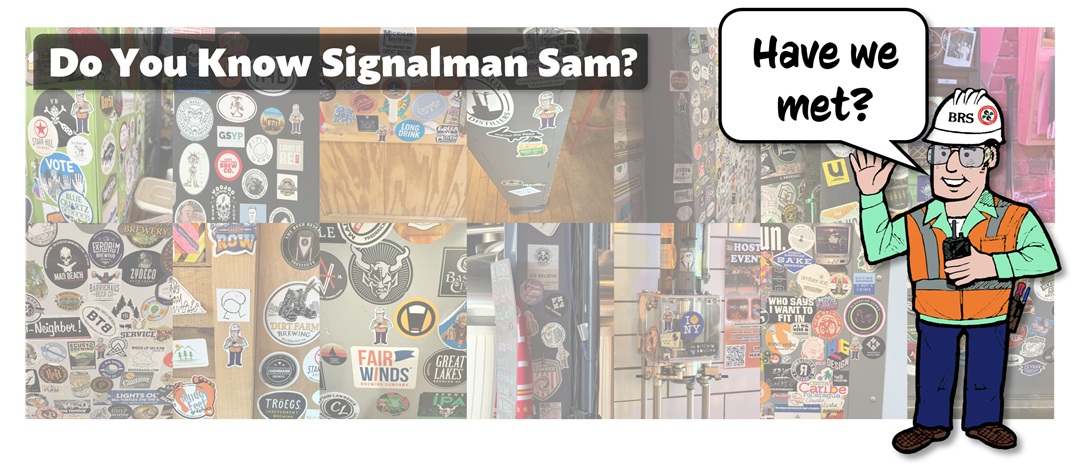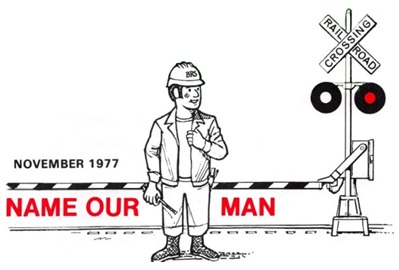Discover the mission, history, and values of the Brotherhood of Railroad Signalmen (BRS), a national labor union representing signal and communications workers across North America.

|

In November 1977, the BRS launched a contest to name our new signal mascot. The winning choice, “Signalman Sam,” debuted in January 1978 and appeared on the cover of The Signalman’s Journal until his retirement in 1983.
In 2024, Sam received a much-needed facelift and was reintroduced as the official BRS mascot. You will see him in our publications, at local gatherings, and out in the wild as part of our sticker campaign. If you spot Sam, snap a photo and send it to info@brs.org with the subject: Signalman Sam.
Keep your eyes peeled.
|
|
|
|
|
|
The Brotherhood of Railroad Signalmen (BRS), founded in 1901, is a proud and nationally recognized trade union representing over 10,000 signal professionals across the United States and Canada. Our members are the backbone of rail safety and efficiency—installing, maintaining, and repairing vital signal systems, including warning devices at highway-rail grade crossings.
Headquartered in Front Royal, Virginia, the BRS represents signal employees on both freight and passenger railroads, including major commuter lines. With a presence spanning the continent, we are united in our commitment to safety, solidarity, and progress. As an affiliate of the AFL-CIO and the Transportation Trades Department, the BRS stands firmly within the broader labor movement, fighting for the rights and recognition our members deserve.
The BRS ensures you have a voice. Join the BRS today!
|
|
|
|
|
|
|
|
OUR MEMBERS
Our members are highly trained professionals essential to the safety and efficiency of rail transportation. Signalmen play a vital role in ensuring the smooth operation of signaling systems across freight, passenger, and commuter railroads by:
- Installing and maintaining advanced signaling equipment
- Diagnosing issues and performing repairs to prevent system failures
- Enforcing regulatory compliance and operational safety standards
- Promoting public safety through the accurate and timely function of signals at crossings and throughout the rail network
|
|
|
|
|
|
|
|
WHY UNION?
Union membership offers significant advantages that enhance the professional and personal lives of workers. Beyond advocating for fair wages and safe working conditions, unions provide a collective voice that empowers individuals in the workplace.
|
Wages: Union workers typically earn higher wages compared to their non-union counterparts. The U.S. Department of the Treasury notes that simple comparisons show union workers earning about 20% more than non-union workers.*
Defined Benefit Pension Plans: Access to defined benefit pension plans is far more common among union workers. In March 2023, 58% of private industry union workers participated in defined benefit plans, compared to only 7% of non-union workers.*
Employer-Provided Health Insurance: Union members are significantly more likely to have employer-provided health insurance. According to the AFL-CIO, 96% of union workers have employer-provided health insurance, whereas only 69% of non-union workers do.*
|
In addition to these measurable benefits, unions also play a critical role in advancing workplace equity and expanding access to training and apprenticeship programs. By joining a union, workers gain a powerful advocate that negotiates on their behalf for improved wages, comprehensive benefits, and equitable treatment, contributing to a more secure and rewarding career.
*Sources: U.S. Department of the Treasury, Bureau of Labor Statistics, AFL-CIO
|
|
WHEN YOU HAVE UNION BACKING – YOUR VOICE TRANSLATES INTO BETTER WAGES, BETTER HEALTH CARE, AND A MORE SECURE RETIREMENT.
Learn More About How Unions Impact Our Lives below.
|
|
|
|
|
|
|
|
|
Page Last Updated: Nov 10, 2025 (12:51:18)
|
|
